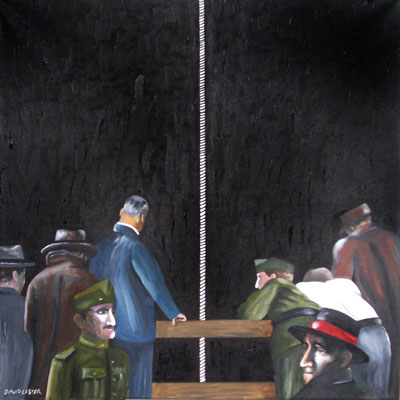 Every Saturday, we’ll be posting a new illustration by David Lester. The Mecca Normal guitarist is visually documenting people, places and events from his band’s 27-year run, with text by vocalist Jean Smith.
Every Saturday, we’ll be posting a new illustration by David Lester. The Mecca Normal guitarist is visually documenting people, places and events from his band’s 27-year run, with text by vocalist Jean Smith.
Hi Tobi,
I don’t think we have an actual one sheet for the K seven-inch, but yes, it came out in November, 2010.
Calvin said “Malachi” is the best song Mecca Normal has ever written. He saw us play it when we opened for Kimya Dawson. So I asked him, some time later, if he would record it. We went into Dub Narcotic Studios when we were in Olympia in May 2010, to launch the Black Dot Museum of Political Art at Northern.
Most recently, we’ve been playing “Malachi” within an adaptation of David’s graphic novel, The Listener, which we’ve been presenting in classrooms, libraries and bookstores. We were rehearsing “Malachi” for the Mecca Normal segment of our presentation when I realized that David’s protagonist Louise is a political artist and activist whose work was taken out of context, resulting in a tragedy that she was blamed for. This is a similar story to Malachi’s. He was a war protester, an activist, who self-immolated on a freeway outside Chicago. He videoed his death, intending for it to be aired on mainstream media, to make a statement about the war in Iraq. His family didn’t want the video to air, so his action, his death, the impact he intended, were very much diluted. David and I talked about this in rehearsal as we were writing the song, but it was much later that I realized our song was a viable way to let more people know about Malachi’s action.
This was all years before the street vendor in Tunisia self-immolated to protest harassment and the confiscation of his wares. He was a catalyst for the Tunisian Revolution: demonstrations in protest of social and political issues in the country. The success of the Tunisian actions sparked protest in other Arab countries. This was pre-Egypt, which is when I tuned-in, so I hadn’t actually heard about the street vendor in Tunisia. It was after the classroom event at the University of British Columbia, when one of the students came up and handed me a very small piece of paper with tiny printing on it: self-immolation in Tunisia. He told me to google it. This was great, because up until then, I didn’t really have a reference point to use to explain self-immolation, other than monks during the war in Vietnam. Dave and I knew through questions asked at a high school that some students had no idea what lynching was, let alone self-immolation.
The interaction with that student, after talking about the song and having the feeling that I wasn’t well-enough informed about the issue, reminded me that I don’t have to be perfect in order to write a song or give a presentation. I think perfectionism stops people from taking action; they feel they might make a mistake. Yes, we probably will. In this instance, it resulted in a student sharing information, a short discussion and a new awareness of facts. Being under-informed is a great way to start a discussion.
This was a sort of unintentional progression of events that affirmed the usefulness of political songwriting in the same way that David’s Inspired Agitators poster series focuses on individuals who are not necessarily well-known or successful in their endeavors, but through their own personal conviction and tenacity, they attempted to make progressive social change.
Yours, Jean






